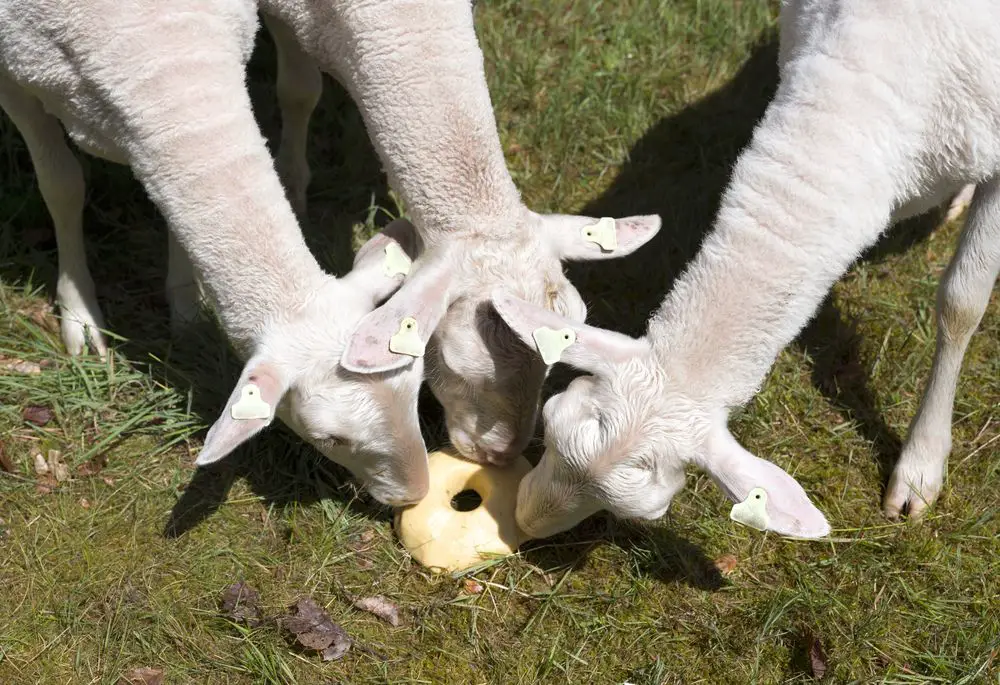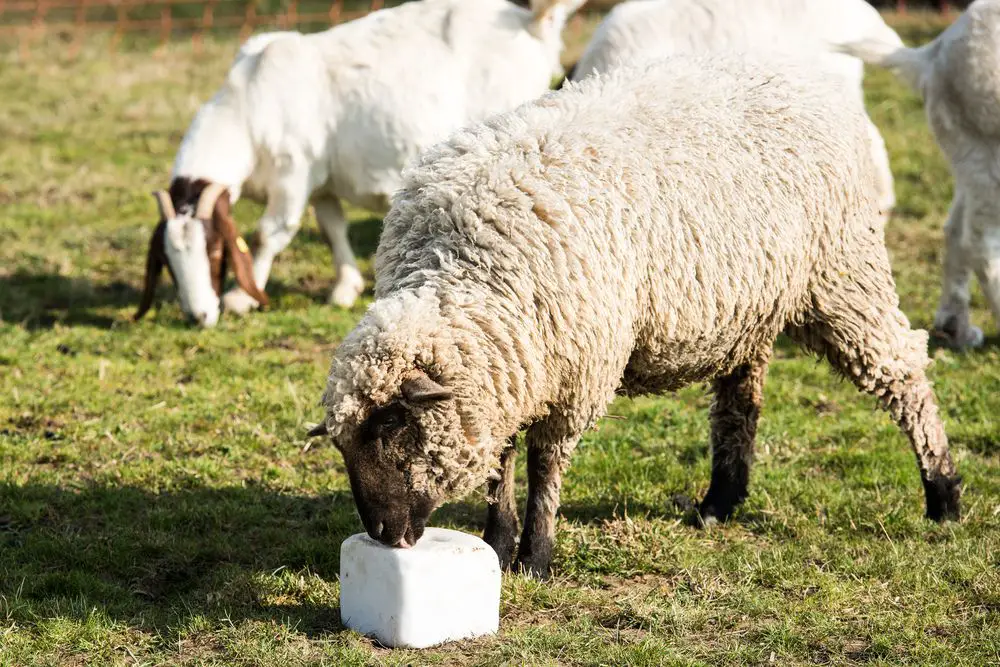Supplementing sheep with minerals block forms has long been a practical, waste-free practice. These forms vary in size, nutrient content, intake rates, and intended usage.
Sheep can get the majority of their nutritional needs from grain and pasture, but some blocks and licks will certainly go the extra mile.
Table of Contents
Best Mineral Supplements for Sheep
| Blocks | A solid block that is set up on the floor or mounted to the barn wall for the sheep to lick and chew on, with special mineral block feeders also available. Your sheep will chew and lick on protein and salt blocks at their leisure. |
| Licks | Usually a pure livestock salt or a mineral mixture hanging on a rope close to the sheep’s water source. Medicated lick tubs are available for sheep with certain health deficiencies. |
| Protein Tubs | A protein-rich mineral mixture that is softer than mineral blocks. Protein tubs don’t need be used for the entire flock, so just add it for ewes in late pregnancy to help give birth to strong, healthy lambs. |
| Loose Supplement | A loose blend of sheep minerals that can be placed right into a feeder. It’s best to avoid combining them with water as this can make the mineral clump together and taste bad. |

There isn’t ‘too much‘ of a certain mineral as they will consume them as needed.
Minerals To Look For in Supplements
A detailed percentages of recommended minerals and vitamins for sheep in this table.
Macrominerals
Macrominerals are required in larger amounts.
| Adequate | Potassium |
| Deficient | Sodium (when combined with Chlorine, makes salt) |
| Marginal | Calcium, Magnesium, Phosphorus, Sulfur |
Supplementation depends on pasture availability.
Microminerals
Often known as trace minerals, are minerals that are required in very minute amounts.
| Adequate | Manganese, Iron |
| Deficient | Selenium |
| Marginal | Zinc, Copper |
Sheep require either milligrams per head per day or parts per million of these minerals, depending on the species.
Minerals and What They Do For Your Sheep
| Calcium | In young and fast-growing animals, calcium, phosphorus, and vitamin D can help with the development of strong bones. Rickets can result from imbalances or deficits of any of these minerals in a lamb. Although phosphorus and vitamin D deficiencies are the most common culprits. |
| PhosphorusSheep that live off of brown, summer pasture and winter range may become deficient in phosphorus. A phosphorus supplement diluted with a salt-trace mineral solution is advisable. for sheep raised on such forages or fed low-quality hay without grains. | |
| Magnesium | Sheep need a continuous supply of magnesium because they cannot store it. But, it plays a crucial role in many energy-producing processes in their tissues. It is also necessary to keep nerve pulses transmitting normally. Lack of magnesium can cause appetite suppression and lower feed intake. |
| Copper | Added copper is essential for several processes. These includes the growth of antibodies and red blood cells, and with the synthesis of wool. Also with the coloring of skin, wool, and hair, the preservation of hoof tissue, and many others. |
| Manganese | This is essential for the useful operation of several enzymes in sheep and cattle. The creation of hormones, bone, and teeth depends on many of these. Additionally for the transformation of ingested carbohydrates into glucose. |
| Selenium | Selenium and vitamin E are crucial nutrients for sheep diets. Because they prevent and treat cellular damage. |
| Vitamin A | Sheep are unable to produce vitamin A on their own. They must consume green plants that contain carotenoid precursors like carotene. |
| Vitamin E | Both vitamin E and selenium are essential for growth, reproduction, and the prevention of white muscle disease. They also both contribute to immunological health. |
Selenium and salt are two of the most often deficient nutrients in sheep, especially in the United States where soils are typically poor in selenium.
When taken in excess, some minerals such as iron can prevent the absorption of other minerals like zinc. You should check that your percentages are in line with the requirements of your sheep at each stage of development.
Other Minerals
| Additives | The wellbeing of the flock and the individual sheep may be improved by chemical additions to the feed. Some of the most common feed supplements for sheep include antibiotics, ionophores, and probiotics. |
| Electrolytes | These are minerals in the body that carry an electric charge, and are present in the tissues, blood, urine, and other fluids. Electrolytes maintain a healthy balance of water content in a body. |
| Sheep Feed | Food produced specifically for poultry and cattle. Modern livestock feeds are prepared by choosing and mixing ingredients to create nutritious meals. |
Why Do Sheep Need Mineral Supplements?
Sheep need specific minerals to raise lambs and to produce milk and wool, with mineral deficiencies hampering the commercial productivity of your flock.
A reliable supplement will give animals more nourishment beyond their primary feed ration.
Your sheep will need varying amounts of particular nutrients, depending on their life stage (early pregnancy, late pregnancy, lactating, newborn lamb, etc.).
Will Any Mineral Supplement Work?
It’s best to get sheep-specific mineral blocks, mineral licks, or loose supplements as sheep have different mineral needs when compared to other animals such as goats.
Sheep are also very sensitive to copper which can be found in the supplements of other animals. 500 milligrams of copper per day is their maximum intake, while 300mg is safer.

